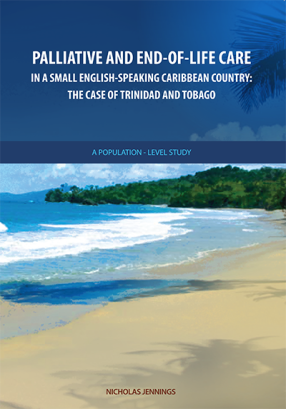Author: Nicholas Jennings
Date: 08-07-2021
Supervisors:
Prof. dr. Joachim Cohen (Vrije Universiteit Brussel)
Prof. dr. Kenneth Chambaere (Vrije Universiteit Brussel)
Prof. dr. Luc Deliens (Vrije Universiteit Brussel)
Prof. dr. Cheryl Cox Macpherson (St. George’s University)
SUMMARY OF THE DISSERTATION
Trinidad and Tobago is a high-income country, and one of the English-speaking Caribbean’s Small Island Developing States (SIDS); a unique group of developing countries with similar challenges to their sustainable development. Trinidad and Tobago has moved through a demographic and epidemiological transition – communicable to non-communicable disease – and has a rapidly aging population. In 2019 the population was estimated at 1.4 million of which 18.2% was 60 years and older, this demographic is anticipated to steadily increase to 24.5% by 2030 and 36.5% by 2050. Trinidad and Tobago also has one of the highest rates for morbidity and mortality from non-communicable or chronic diseases, which were estimated to have accounted for 81% of all deaths in 2016. Cardiovascular diseases 33%, cancers 15%, diabetes mellitus 15% and chronic respiratory diseases 3% were among the main causes of death. There is limited palliative care services compared to need and a lack of relevant research activity in Trinidad and Tobago and the Caribbean region. From a public health perspective this presents several important challenges: how to guarantee favourable circumstances in which people can die (for
example, free from avoidable symptoms and problems), how to guarantee access to appropriate health care and end-of-life care for these populations, how to optimise the efficiency and cost effectiveness of available health care resources, and how to develop strategies for health care by non-professional community services. The main objectives of this dissertation are to describe the circumstances under which persons die and to describe the medical care and treatment a person received prior to their death in Trinidad and Tobago.


